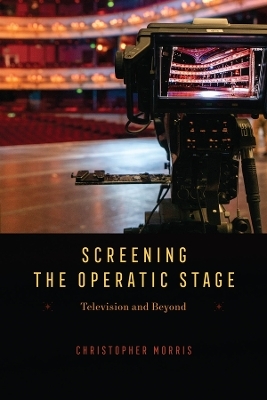
Screening the Operatic Stage
Television and Beyond
Seiten
2024
University of Chicago Press (Verlag)
978-0-226-83129-9 (ISBN)
University of Chicago Press (Verlag)
978-0-226-83129-9 (ISBN)
An ambitious study of the ways opera has sought to ensure its popularity by keeping pace with changes in media technology.
From the early days of television broadcasts to today’s live streams, opera houses have embraced technology as a way to reach new audiences. But how do these new forms of remediated opera extend, amplify, or undermine production values, and what does the audience gain or lose in the process? In Screening the Operatic Stage, Christopher Morris critically examines the cultural implications of opera’s engagement with screen media.
Foregrounding the potential for a playful exchange and self-awareness between stage and screen, Morris uses the conceptual tools of media theory to understand the historical and contemporary screen cultures that have transmitted the opera house into living rooms, onto desktops and portable devices, and across networks of movie theaters. If these screen cultures reveal how inherently “technological” opera is as a medium, they also highlight a deep suspicion among opera producers and audiences toward the intervention of media technology. Ultimately, Screening the Operatic Stage shows how the conventions of televisual representation employed in opera have masked the mediating effects of technology in the name of fidelity to live performance.
From the early days of television broadcasts to today’s live streams, opera houses have embraced technology as a way to reach new audiences. But how do these new forms of remediated opera extend, amplify, or undermine production values, and what does the audience gain or lose in the process? In Screening the Operatic Stage, Christopher Morris critically examines the cultural implications of opera’s engagement with screen media.
Foregrounding the potential for a playful exchange and self-awareness between stage and screen, Morris uses the conceptual tools of media theory to understand the historical and contemporary screen cultures that have transmitted the opera house into living rooms, onto desktops and portable devices, and across networks of movie theaters. If these screen cultures reveal how inherently “technological” opera is as a medium, they also highlight a deep suspicion among opera producers and audiences toward the intervention of media technology. Ultimately, Screening the Operatic Stage shows how the conventions of televisual representation employed in opera have masked the mediating effects of technology in the name of fidelity to live performance.
Christopher Morris is professor of music at the National University of Ireland Maynooth. He is the author of Modernism and the Cult of Mountains: Music, Opera, Cinema and Reading Opera Between the Lines: Orchestral Interludes and Cultural Meaning from Wagner to Berg. He is co-executive editor of Opera Quarterly.
List of Figures
Introduction
Part 1
1: Screening the Stage/Staging the Screen
2: Split Loyalties
Part 2
3: What Time Is It in New York?
4: You Are Here
5: You Are More Than Here
6: You Are Not Here
Part 3
7: Hosts and Ghosts
Conclusion
Acknowledgments
Notes
Bibliography
Videography
Index
| Erscheinungsdatum | 06.03.2024 |
|---|---|
| Reihe/Serie | Opera Lab: Explorations in History, Technology, and Performance |
| Zusatzinfo | 40 halftones |
| Sprache | englisch |
| Maße | 152 x 229 mm |
| Gewicht | 367 g |
| Themenwelt | Kunst / Musik / Theater ► Film / TV |
| Kunst / Musik / Theater ► Musik ► Klassik / Oper / Musical | |
| Sozialwissenschaften ► Kommunikation / Medien ► Medienwissenschaft | |
| ISBN-10 | 0-226-83129-9 / 0226831299 |
| ISBN-13 | 978-0-226-83129-9 / 9780226831299 |
| Zustand | Neuware |
| Informationen gemäß Produktsicherheitsverordnung (GPSR) | |
| Haben Sie eine Frage zum Produkt? |
Mehr entdecken
aus dem Bereich
aus dem Bereich
Mozart und der Abschied von der Aufklärung
Buch | Hardcover (2024)
C.H.Beck (Verlag)
CHF 41,90


